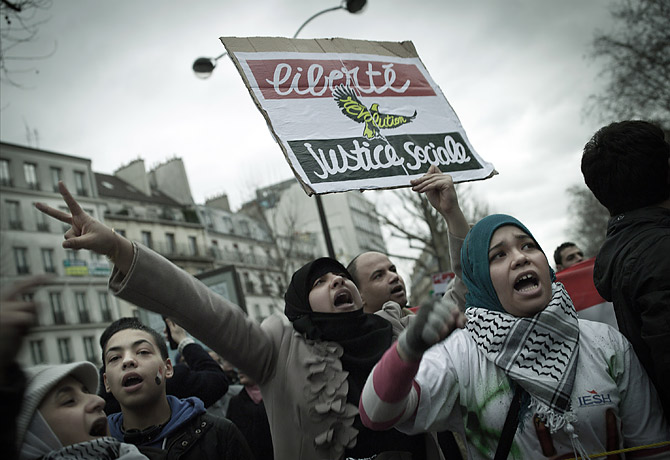
Demonstrators at an event to support the revolution in Egypt, Paris, Feb. 6th, 2011.
As the youth of Algeria, Libya and other Middle Eastern countries take to the streets to challenge autocratic regimes, hoping to reprise Tunisia's success in dispatching President Zine el Abidine Ben Ali, their cousins in Europe are avidly following their progress. And young Europeans with roots in North Africa warn that the protest movements are unlikely to produce similar results in all Arab countries — or to necessarily produce any results at all. Still, millions of Arab expatriates around the world are watching anxiously. "This isn't about each person only caring about how these movements apply to the countries they have ties to, but about seeing whether similar results materialize in Yemen, Bahrain, etc.," says Esma Ben Saïd, 23, a Tunisian citizen who participated in her nation's uprising before returning to France to pursue a masters degree in geo-economics and strategic intelligence."Even if regimes across the Arab world don't topple, people are keen to see whether this wind of change can at least provoke less radical, but still very real change populations elsewhere are demanding."
So, even if demonstrators in Libya did manage to overcome the regime's willingness to spill blood to stay in power and bring down Muammar Gaddafi, don't expect regimes in Algeria and Morocco to fall like dominoes despite growing protest movements in those countries. Algeria has experienced mass marches and even clashes between youths and police since January — with more rallies planned. But the economic pain fueling the anger, and memories of earlier revolts that brought more death than lasting improvement, suggests that Algerians may settle for less than Tunisian-style revolution. And the country's military-backed regime seems to understand that. In response to rising anger over food prices and limited civil liberties, Algerian President Abdelaziz Bouteflika this month said he'd repeal the 19-year state of emergency imposed to contain the Islamist challenge. Some people now hope he may divert some of the national riches pilfered by the regime to subsidize basic foodstuffs in the hope of calming unrest — as Ben Ali did, in vain.
"Algeria is a very rich country — far richer than Tunisia — and there is money to spend in the state coffers and in leaders' bank accounts," says a 33 year-old Algerian waiter in Paris who gives only his first name, Hocine. "Money is there to spend to address public complaints and reduce anger that has fueled recent protests. The question is how far those will have to go before the greed of leaders is offset by their desire to remain in power."
Meanwhile, though widely hated for its brutality and corruption, Algeria's regime has made it abundantly clear it's ready to use its gigantic army and security forces to retain its hold on power — no matter how many of its own citizens it has to kill. That's one reason why reform, not revolution, has been the main rallying cry in Algeria. The same is true in Morocco, where the monarchy remains sufficiently popular despite increasing economic unhappiness among the public that no one but the most radical opponents call for the royal family's ouster. "The number of Moroccans hostile to King Mohammed VI is pretty small," says Samia, a 38 year-old Dutch school administrator of Moroccan descent who prefers not to give her last name. "People want improvement and change, but these events (elsewhere in the Arab world) seem fairly remote, and have little consequence for us, or Morocco."
Perhaps, but Sarra Grira, a 25 year-old Tunisian studying for a doctorate in Paris, says that the Egyptian and Tunisian precedents show that movements formed to demand relief from dire economic realities swiftly connect their grievances to demands for political change. "When you've got regimes like Ben Ali's controlling everything, you realize their total political power — and complete incompetence — are entirely responsible for the economic situation," Grira says. "One arises from the other, which is why economic demands quickly turn political."
Still, it appears unlikely movements in Algeria or Morocco — much less Syria, Lebanon, Jordan, or Saudi Arabia — will shift current calls for reform into full-fledged pushes towards revolution. But some feel the mere examples of Egypt and Tunisia will suffice to convince Arab publics, and warn their atrophic regimes, that change is on the way.
"The operating assumption for so long has been that Arab populations really can't be trusted with democracy, and will somehow screw up freedom in a way that makes either dictatorships or Islamist revolutions inevitable," says Bader Lejmi, a 25-year-old Franco-Tunisian, whose working to add a sociology diploma to his degree in business. "That's built on a lie, and is a reputation all Arabs want to be rid of, since the assumption it's built on applies just as well for Arabs in Europe as it does those in the Middle East and North Africa."